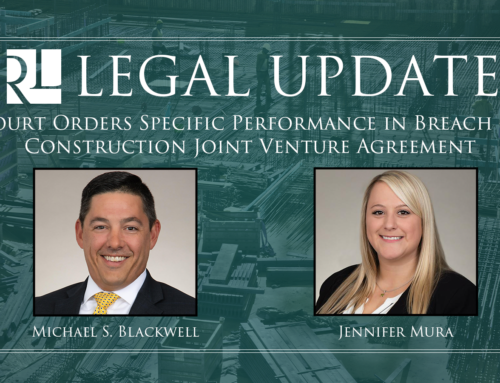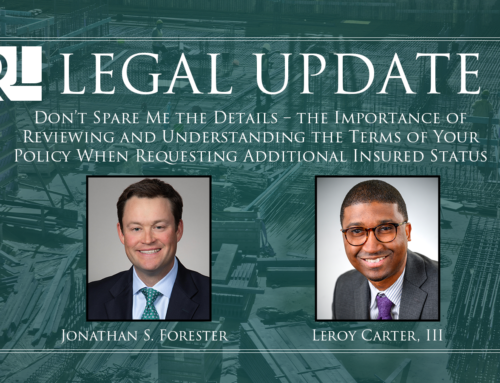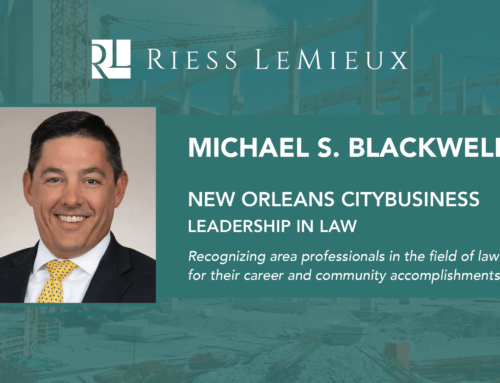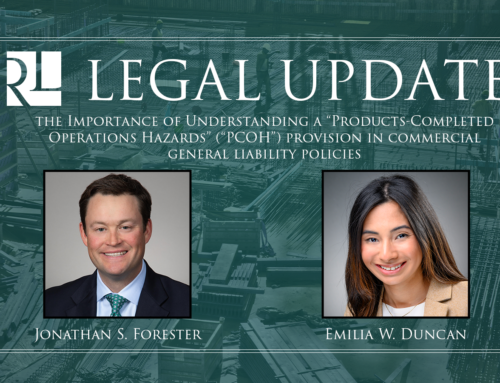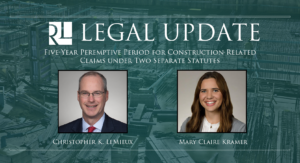 First Circuit Upholds Five-Year Peremptive Period for Construction-Related Claims under Two Separate Statutes
First Circuit Upholds Five-Year Peremptive Period for Construction-Related Claims under Two Separate Statutes
Authors: Christopher K. LeMieux and Mary Claire Kramer
Two recent First Circuit cases examine the five-year preemptive period applicable to design professionals and contractors in the context of two different statutes, namely La R.S. 9:2772 and La. R.S. 9:5607.
In Conti Enterprises, Inc. v. Providence/.GSE Associates, LLC, Robert E. Williams, Jr. and Aspen Specialty Company, 2023 WL 7125055, the Court considered a five year preemptive period pursuant to La. R.S. 9:5607(A)(3). Conti Enterprises, Inc. (“Conti”) served as a general contractor, on a project in Terrebonne Parish known as the “Hollywood Road Widening Project” (“Project”). The Project was let by the Terrebonne Consolidated Government (“TPCG”) and the (“DOTD”).
In its Petition, Conti alleged that its bid price on the Project was based on its ability to perform pursuant to Project’s plans, specifications, and bidding documents. Conti further alleged that it became obvious during the construction that the plans, specifications, and bidding documents were inadequate including the portions designed and issued by TPCG and DOTD. Conti filed suit against numerous parties including TPCG and DOTD for losses it claimed were caused by the wrongful acts of the defendants during the construction administration phase.
In turn, in 2020, TPGC filed a third-party demand against Hartman Engineering, Inc. (“Hartman”) alleging that TPCG contracted with Hartman in 1998 for the preparation of environmental assessment and plans and specifications for the Project.
Hartman filed for summary judgment relying on La. R.S. 9:5607(A)(3) which provides that that when an engineer only performs work preparatory to construction and does not perform any inspection of the work, the peremptive period begins the date the person furnishing the services completed the work. Thus, under La. R.S. 9:507(A)(3) TPCG’s claims were barred by the five-year peremptive period which began when Hartman completed its services in September 2013.
TPCG countered that the claims were timely under either La. R.S. 48:251.3 or La. R.S. 9:5607(A)(1), which would start the period from the project’s final acceptance in June 2017. TPCG asserted that La R.S. 48:251.3 governs DOTD related contracts and should apply as the Project was let by the DOTD. In the alternative, TPCG argued that La. R.S. 9:5607(A)(1) governed because the owner of Hartman, who was also an engineer, was retained to testify on behalf of TPCG to review documents and provide opinions in an a separate lawsuit regarding the Project. TPCG argues that this constituted inspection services and rendered La R.S. 9:5607(A)(3) inapplicable.
The trial court granted summary judgment in favor of Hartman, leading to TPCG’s appeal. The First Circuit affirmed the trial court’s ruling noting that TPCG’s claims were perempted. First, the Court found there was insufficient evidence to categorize Hartman’s testimony as inspection services to render La R.S. 9:5607(A)(3) inapplicable.
Next, the court held that although the DOTD statute did apply, because La R.S. 9:5607 was the more specific statute, it controlled. The Court noted that the legislative intent in crafting the peremptive period was to destroy the cause of action itself. Thus, TPCG had five years from Hartman’s completion of services in 2013 before the cause of action ceased to exist.
In Whitney Bank v. Henry Rayford 2023 WL 7144928, Henry Rayford (“Rayford”) contracted with Nobles Construction, L.L.C. (“Nobles”) to build three houses intended as rental properties. After Nobles completed the houses in 2008, Rayford alleged certain construction defects made the houses uninhabitable. As a result, Rayford defaulted on promissory notes which in turn prompted Whitney Bank to file suit. In 2016, response, Rayford filed a third-party demand against Nobles alleging Nobles committed fraud by failing to obtain required building permits.
Nobles filed an exception arguing that Rayford’s claims were exempted pursuant to La. R.S. 9:2772 which provides that “no action, whether arising in contract, tort, or otherwise, shall be brought against any person for the construction of immovables, or improvement to immovable property, more than five years after the owner has occupied or taken possession of the improvement, in whole or in part”.
However, La. R.S. 9:2772(H)(1) provides that the five-year peremptive period does not apply to any person “whose fraud has caused the breach of contract or damages sued upon.” Thus, Nobles argued that Rayford’s allegations were unsubstantiated which rendered the five year period inapplicable.
After multiple appeals, the First Circuit determined that La R.S. 9:2772 required the allegations of fraud to be tried separately, prior to the trial of any other issues. Thus, the trial court held a trial on Rayford’s allegations of fraud, and found that Rayford did not provide sufficient evidence of fraud. Rayford appealed the matter once again.
The appellate court agreed with the trial court’s findings. The court also found no error in the trial court’s ruling that Rayford’s claim was barred by preemption, as his third-party demand was filed over eight years after taking possession of the houses, exceeding the statutory five-year limit.
Overall, the First Circuit continues to exercise a consistent policy in the dismissal of construction-related claims under both La. R.S. 9:2772 and La. R.S. 9:5607. This consistency provides a measure of certainty not only for contractors and subcontractors, but also for architects, engineers, and others engaged in the construction process.
